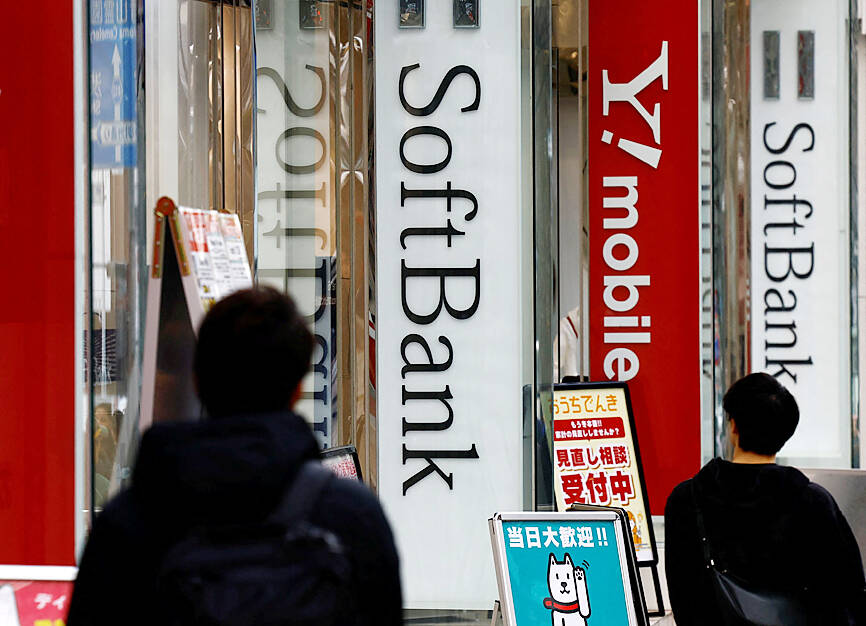Softbank Group Corp is in talks to invest up to US$25 billion in ChatGPT owner OpenAI, according to a person familiar with the matter, as the Japanese conglomerate continues to expand into the sector.
Softbank could invest US$15 billion to US$25 billion directly into Microsoft Corp-backed OpenAI, some of which may be used to pay for OpenAI’s commitment to Project Stargate, the person said.
Stargate is a Texas-based joint venture by Oracle Corp, OpenAI and Softbank that plans to invest up to US$500 billion to build data centers and other artificial intelligence (AI) infrastructure to support the ChatGPT maker as well as help the US stay ahead of China and other rivals in the global AI race.

Photo: Reuters
Softbank’s investment would be on top of the US$15 billion it has already committed to Stargate, the person said, adding that the talks are at an early stage.
The latest OpenAI investment talks were reported by the Financial Times yesterday.
The Stargate venture was announced by US President Donald Trump, Softbank CEO Masayoshi Son, OpenAI CEO Sam Altman and Oracle chairman Larry Ellison at the White House last week.
However, since then, a little-known start-up from China, DeepSeek (深度求索), has upended markets with a free AI assistant it said was developed cheaply using lower-cost chips and less data than its US rivals.
Softbank’s share price surged on news of the Stargate project, but has fallen more than 12 percent since the DeepSeek-induced selloff began. Yesterday, Softbank’s shares fell as much as 2.1 percent before paring some of their losses, but the news of OpenAI investment helped lift sentiment for tech stocks more broadly.
Softbank last year took a US$1.5 billion stake in OpenAI, which was valued at US$157 billion in its last funding round, cementing its status as one of the most valuable private companies in the world.
Son’s plan to take a large stake in OpenAI and meet its Stargate commitments has been vetted by senior executives and the board at OpenAI, the Financial Times reported.

NEW IDENTITY: Known for its software, India has expanded into hardware, with its semiconductor industry growing from US$38bn in 2023 to US$45bn to US$50bn India on Saturday inaugurated its first semiconductor assembly and test facility, a milestone in the government’s push to reduce dependence on foreign chipmakers and stake a claim in a sector dominated by China. Indian Prime Minister Narendra Modi opened US firm Micron Technology Inc’s semiconductor assembly, test and packaging unit in his home state of Gujarat, hailing the “dawn of a new era” for India’s technology ambitions. “When young Indians look back in the future, they will see this decade as the turning point in our tech future,” Modi told the event, which was broadcast on his YouTube channel. The plant would convert

‘SEISMIC SHIFT’: The researcher forecast there would be about 1.1 billion mobile shipments this year, down from 1.26 billion the prior year and erasing years of gains The global smartphone market is expected to contract 12.9 percent this year due to the unprecedented memorychip shortage, marking “a crisis like no other,” researcher International Data Corp (IDC) said. The new forecast, a dramatic revision down from earlier estimates, gives the latest accounting of the ongoing memory crunch that is affecting every corner of the electronics industry. The demand for advanced memory to power artificial intelligence (AI) tasks has drained global supply until well into next year and jeopardizes the business model of many smartphone makers. IDC forecast about 1.1 billion mobile shipments this year, down from 1.26 billion the prior

People stand in a Pokemon store in Tokyo on Thursday. One of the world highest-grossing franchises is celebrated its 30th anniversary yesterday.

Zimbabwe’s ban on raw lithium exports is forcing Chinese miners to rethink their strategy, speeding up plans to process the metal locally instead of shipping it to China’s vast rechargeable battery industry. The country is Africa’s largest lithium producer and has one of the world’s largest reserves, according to the US Geological Survey (USGS). Zimbabwe already banned the export of lithium ore in 2022 and last year announced it would halt exports of lithium concentrates from January next year. However, on Wednesday it imposed the ban with immediate effect, leaving unclear what the lithium mining sector would do in the